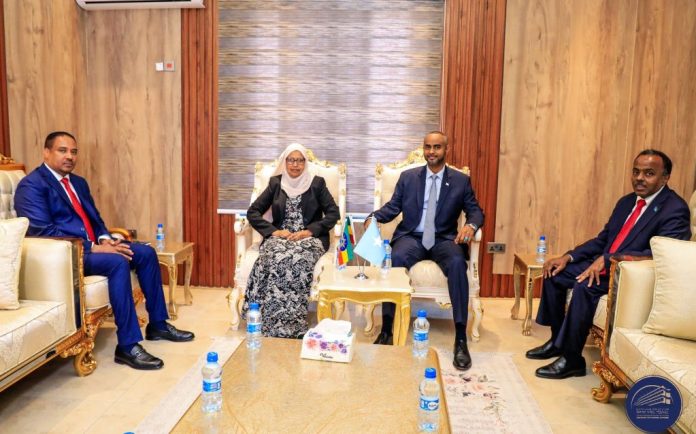Facebook Twitter (X) Instagram Somali Magazine - People's Magazine
In a significant diplomatic development, Somalia has announced its willingness to consider Ethiopia’s request to contribute forces to the African Union’s new peacekeeping mission, AUSSOM. The decision comes following a high-profile visit by Ethiopia’s Defense Minister, Aisha Mohammed, to Mogadishu.
Ethiopian Defense Minister Visits Somalia
Ethiopia’s Defense Minister Aisha Mohammed, accompanied by State Minister for Foreign Affairs Mesganu Arega, held talks with her Somali counterpart, Abdulkadir Mohamed Nur, in Mogadishu. The meeting aimed to reinforce diplomatic ties and discuss regional security cooperation between the two neighboring nations.
The visit, described by Somalia’s Ministry of Foreign Affairs as part of ongoing efforts to build on the Ankara Declaration signed on December 11, 2024, focused on:
Regional stability
Finalizing the composition of the African Union Support and Stabilization Mission (AUSSOM)
Strengthening bilateral relations
Ethiopia’s Role in Regional Peacekeeping
Ethiopia has historically played a significant role in African Union peacekeeping efforts in Somalia, particularly under the AMISOM mission. Ethiopia now seeks to continue its contributions through the new AUSSOM framework.
Ethiopia’s Defense Minister reaffirmed the country’s commitment to regional stability, emphasizing that combating terrorism and ensuring peace were central to Ethiopia’s security strategy. However, Somalia’s statement did not clarify whether Ethiopia would officially be part of the finalized AUSSOM troop composition. Instead, it stated that Somalia “expressed its willingness to consider Ethiopia’s request.”
Tensions Over Military Presence in Somalia
While Ethiopia continues to advocate for participation in the AUSSOM mission, the situation remains complex due to recent regional tensions. Ethiopia previously faced allegations of an attack on Somali forces in Doolow, an accusation it denied.
Adding to the complexity, Somalia has signed a defense pact with Egypt, under which Cairo committed to deploying 10,000 troops to Somalia. However, this move has sparked tensions, particularly with Ethiopia, which views the Egyptian military presence as a potential national security threat.
Regional states within Somalia, including Puntland and Jubaland, have also opposed the Egyptian troop deployment, raising further concerns about the mission’s stability.
The Ankara Declaration: A Step Toward Reconciliation
The Ankara Declaration, signed in December 2024, aimed to rebuild trust between Ethiopia and Somalia after a period of strained relations. Both nations have since engaged in diplomatic visits, including a recent trip to Addis Ababa by Somalia’s State Minister for Foreign Affairs, Ali Omar.
The declaration emphasized the importance of cooperation and mutual respect for sovereignty. Somalia’s Ministry of Foreign Affairs expressed optimism, stating, “The principles outlined in the Ankara Declaration provide a solid foundation for rebuilding trust and fostering positive cooperation that serves shared interests.”
However, Ethiopia’s concerns over Egypt’s involvement in Somalia’s security affairs remain a potential stumbling block. Ethiopia has publicly stated that Egyptian military presence could destabilize the region and threaten its national security interests.
Bilateral and Multilateral Security Cooperation
Somalia’s Ministry of Foreign Affairs highlighted that the finalization of the AUSSOM troop composition would continue through both bilateral and multilateral engagements.
Ethiopia’s Defense Minister emphasized that cooperation in combating terrorism, particularly against extremist groups like Al-Shabaab and ISIS, remained a shared priority for both countries.
Challenges and the Path Forward
While diplomatic progress has been made, several challenges could hinder the successful implementation of the AUSSOM mission, including:
Regional Divisions: Puntland and Jubaland’s opposition to Egyptian military presence.
Ethiopian Concerns: Ongoing mistrust over foreign military involvement.
Coordination Issues: Balancing bilateral defense agreements with the broader AU mission goals.
Somalia’s willingness to consider Ethiopia’s participation marks a step toward improving relations, but the broader geopolitical landscape, including Egypt’s involvement, will be critical in determining the mission’s long-term success.
Conclusion
The recent high-level talks between Ethiopia and Somalia signal a renewed effort to enhance regional security cooperation. While Somalia has yet to confirm Ethiopia’s participation in AUSSOM, both nations have expressed commitment to combating terrorism and stabilizing the Horn of Africa.
The coming weeks will be pivotal in determining whether these diplomatic efforts translate into a cohesive and effective peacekeeping mission under the African Union’s framework.

